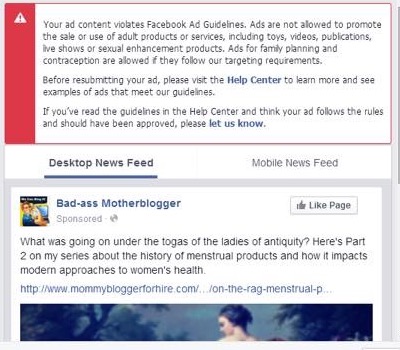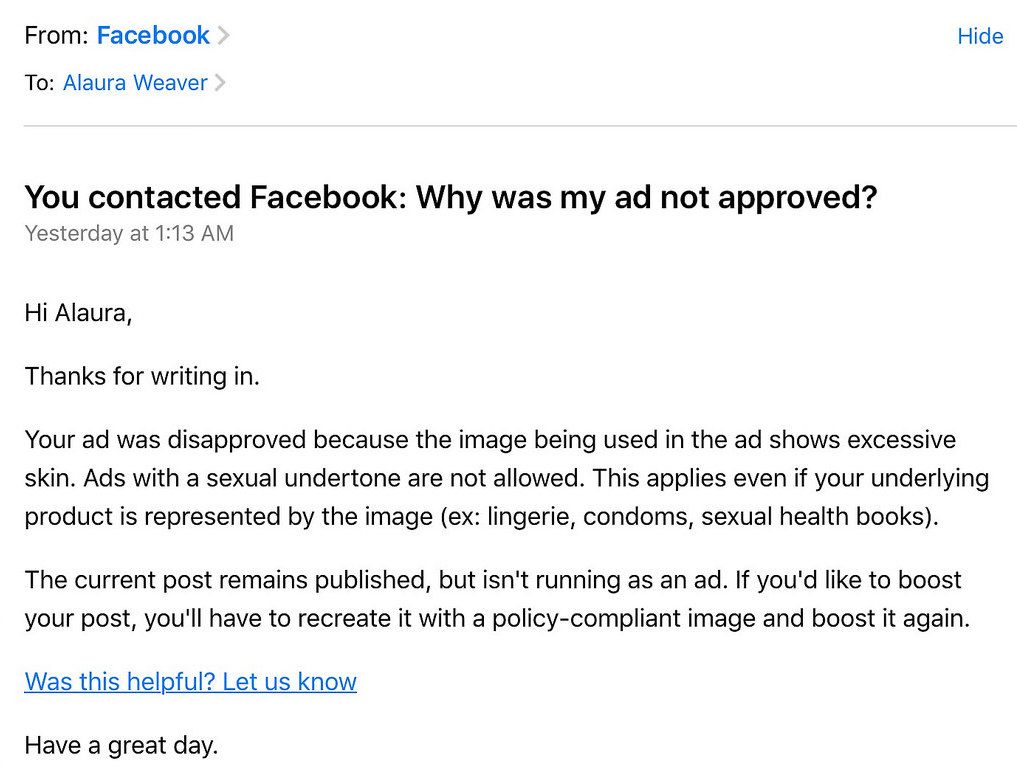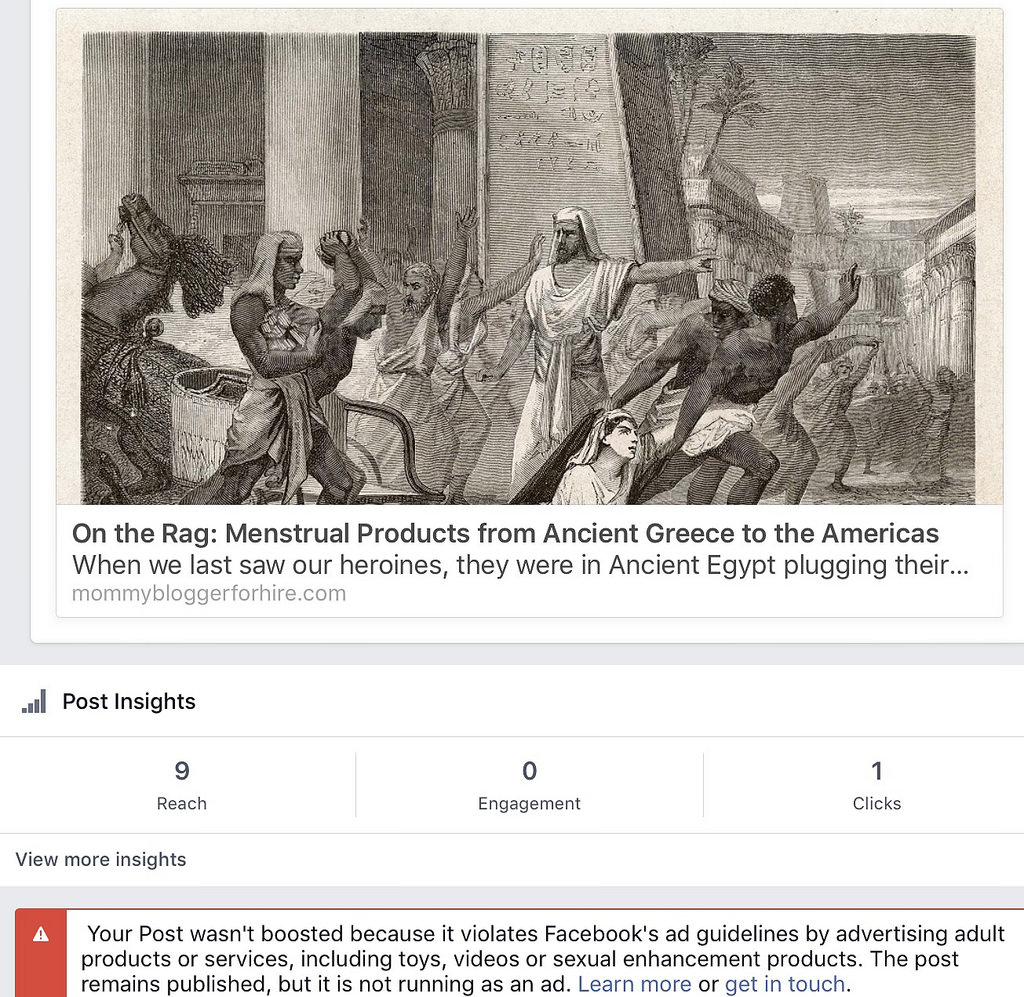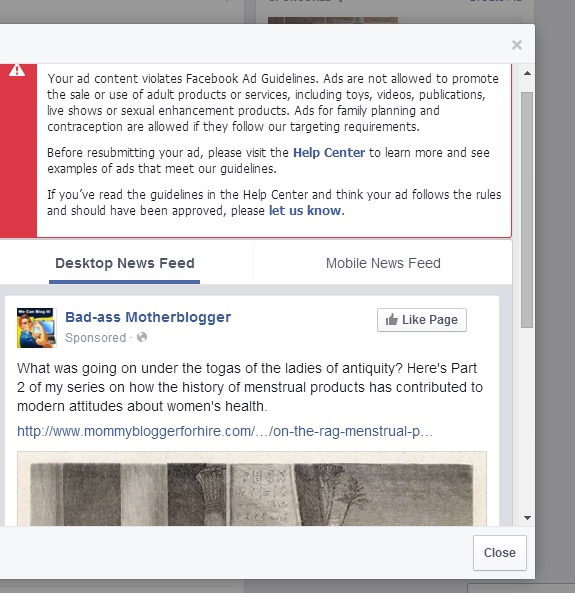Facebook Reprimands Woman for Promoting Female Hygiene Products

By:
A woman's standoff with Facebook's advertisement team is highlighting an important issue: the stigmatization of menstruation.
Self-proclaimed feminist blogger Alaura Weaver is in a battle with the social media site after it rejected an ad promoting her personal blog posts on female hygiene and health products.
The issue first came to light when Weaver detailed her conflict with Facebook—over a blog post about tampons and women's sanitary napkins—on Reddit.
According to Weaver, Facebook first denied her request to publish her advertisement because it violated Facebook's Adults Products Policy. In other words, Facebook flagged Weaver's ad for what they felt was the promotion of sexual products.
 Alaura Weaver/Flickr - flickr.com
Alaura Weaver/Flickr - flickr.com
"I was annoyed when I first saw that it was disapproved," Weaver wrote in an email to ATTN:. "I had assumed that it was because the preview image for my link contained some text. But when I saw the message stating I had violated their Adult Products policy, I was confused and then outraged."
Weaver detailed what she wrote to Facebook after it was rejected:
"My blog post was not approved to be advertised on Facebook because the ad was seen as promoting adult sexual products. The last time I checked, tampons and menstrual products are the last thing most people would want to use as a sex toy. Perhaps there are some out there who enjoy period play, but this article is about the history of women's reproductive health and society's dismissal of it as taboo. Please don't let Facebook follow that historical precedent: allow me to share this article with my audience of advocates for women's rights so more people can learn that women's bodies shouldn't be a source of shame or desire for control.
Thanks,
Alaura"
 Alaura Weaver/Flickr - flickr.com
Alaura Weaver/Flickr - flickr.com
The response from Facebook (above) mentioned that the ad, which had a painting of a nude woman, contained "too much skin." Weaver then changed the photo to "a historical print of Hypatia."
 Alaura Weaver/Flickr - flickr.com
Alaura Weaver/Flickr - flickr.com
Again her ad for the blog about the history of menstrual products was rejected, again citing the Adult Products Policy. According to Weaver, Facebook responded with this message:
"Your ad content violates Facebook Ad Guidelines. Ads are not allowed to promote the sale or use of adult products or services, including toys, videos, publications, live shows or sexual enhancement products. Ads for family planning and contraception are allowed if they follow our targeting requirements."
 Alaura Weaver/Flickr - flickr.com
Alaura Weaver/Flickr - flickr.com
Weaver appealed the decision but hasn't gotten very far.
"[This] tells me a) Facebook isn't paying attention to the context of their advertising customer's content or b) Someone at Facebook has a problem with content about women's health," Weaver said in her email to ATTN:. "Either way, it's undermining a culture of openness and the free exchange of ideas, and as a liberal feminist, I see it as my duty to call out injustice or disempowerment when I see it."
Part of the reason Weaver and other women are outraged over Facebook's attempt to censor Weaver goes beyond freedom of speech. The issue points to society's more global problem of fear and discomfort in discussing women's health issues.
"The act of menstruation is the opposite of the perfect-princess feminine ideal that women are expected to live up to," Weaver wrote. "Periods represent an uncontrollable, messy aspect of being a woman, and people who don't respect the messiness of nature and of life and can't find beauty in it seek to control it and hide it and shame it."
Weaver explained more in her Reddit post:
"Women's bodies aren't sexual objects. And menstrual products, which many girls in poverty-stricken countries and in cultures that have negative superstitions about menstruation can't get access to, are not sexual devices. Let's take the shame out of women's health so we can address these issues openly and without the fear of censorship."
To Weaver's point, many girls around the world do not have the knowledge or the access to appropriate female hygiene products. As of May 2015 only 12 percent of girls and women around the world have access to sanitary products.
But removing the stigma in discussing women's menstruation is even more of an uphill battle. In some cultures around the world menstruation is associated with impurity, evil, uncleanliness, and shame.
In an interview with Jezebel, co-author of "Flow, the Cultural Story of Menstruation," explained how this negative perception of periods is not something new.
"Lots of things have conspired over many centuries to make us mortified about the process. Since ancient times, and around the world, menstruation has been treated as a filthy and shameful thing."
Comedian turned menstruation educator, Chella Quint, started #PeriodPostive, which encourages women to boldly speak up about menstruation. Quint's organization also offers educational tips about female hygiene, something that Weaver hopes to be able to do soon.
"My hope is for Facebook to reconsider their policies regarding what is and isn't sexual content and to have a more human-based approach to their ad approval process," Weaver explained to ATTN:. "My hope for the public is that it will inspire a thoughtful conversation about the cultural source of fear and disgust over women's health issues and how it contributes to global inequalities, poverty, and violence."
ATTN: reached out to Facebook for comment, did not hear back at the time of publication, and will update as necessary.
